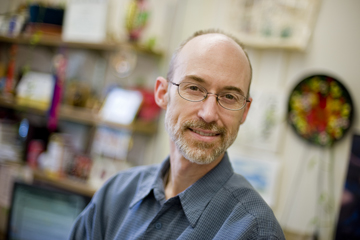Purdue Profiles: Marcus Hammack

Marcus Hammack, senior immigration counselor and coordinator of the International Friendship program for the Office of International Students and Scholars. (Purdue photo/Andrew Hancock.)
The work Marcus Hammack does has been described as "bridging the hearts of two cultures." As senior immigration counselor and coordinator of the International Friendship program for the Office of International Students and Scholars, he not only helps international students and scholars come to Purdue, but also he helps them experience life off campus.
Each year, through the International Friendship program, Hammack helps pair nearly 150 international students with members of the community. From holiday celebrations to street festivals and typical American meals, these friendships provide all involved with the opportunity to learn about another country and culture.
How did you become interested in working with international students?
It was actually during my undergraduate studies at Sam Houston State University. I was studying English, and international students ended up seeking my help with finishing and defending their theses. Through this work, I was introduced to a group that had weekly dinners with international students. That's how I became really involved with international students when I was a student myself.
What is the purpose of the International Friendship program?
A lot of international students come to the United States with an interest in meeting people outside of the University. They know if they come here and only do their studies, they will miss something. They want to try things they haven't had the chance to before and get a sense of what life is like here. For instance, when I was in Japan, I didn't go to McDonald's because we have those here. I wanted to try new places and do new things.
Beyond that, there is a cultural issue as to why this program exists. Many students come from cultures that require a formal connection, a mediator or a matchmaker to begin a friendship, so the International Friendship program acts as that for these students.
You mentioned traveling to Japan. How has this influenced your work with international students?
I've been to Japan three different times, and I knew after the first time that I needed to be there longer than one summer. I needed that experience of living overseas to help relate to the people I wanted to eventually work with -- international students. The first time I was there just for the summer as a conversational English teacher. Three years after that, I was able to return for a year and a half. I was there during the winter Olympics in Nagano, so that was fascinating.
Why are these friendships an important part of being an international student at Purdue?
A few years ago, there was a statistic reporting that about 80 percent of international students were returning home without ever stepping foot inside an American household. This program helps change that for our international students.
International education is not just information; it's transformation. It's about changing the way the students view Americans and the way Americans view international students. It also gives them someone who can help them deal with culture shock when they arrive and someone who can continue to advise them throughout their time here.
How long do these friendships officially last?
International Friendship is designed as a semester-based program, but usually the camaraderie is organic. When we meet someone new, we don't give that friendship a time limit, so we don't enforce a limit with these. The program acts as a formal bridge, but as the semester goes on, we encourage informality, and this is when we see the friendships grow.
International Friendship began in this community about 45 years ago, and at that time, one of our volunteers befriended a student and his two young children. They always stayed in regular contact, and just a few years ago, the student's son, who had just finished his medical degree, moved down the street from the volunteer. Their friendship is one that has gone full circle, and will likely see no end.
